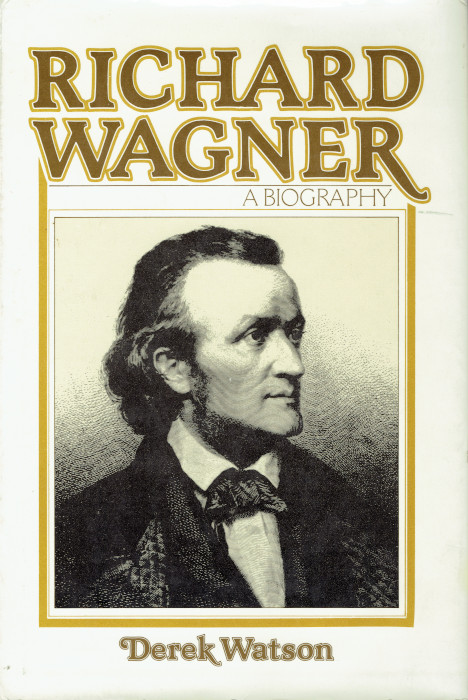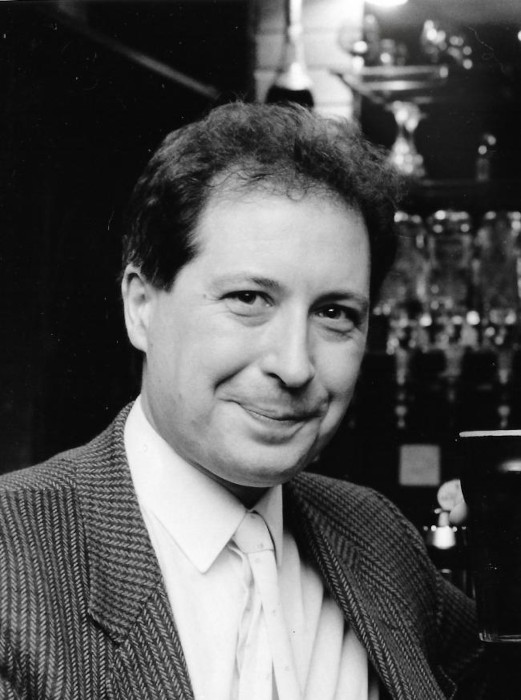Richard Wagner - A Biography
Derek Watson
Contents
Acknowledgments 8
List of Illustrations 9
Preface 11
Sources 13
1 The Cossack 17
2 Years of Apprenticeship 37
3 The Lowest Depths 57
4 Royal Kapellmeister 71
5 Revolution 97
6 Swiss Refuge 116
7 The Child of Sorrow 149
8 Misadventure in Paris 162
9 The Wanderer 178
10 Rescue 195
11 Art and Politics 216
12 The Master of Bayreuth 252
13 The First Festival 269
14 Art and Religion 291
Glossary 321
Select Bibliography 335
Index 340
Musician, author, actor, lecturer and book shop proprietor
Born: November 6, 1948;
Died: September 17, 2018
DEREK Watson, who has died aged 69 following a short illness, was a man of many parts and arts. Those who knew the Edinburgh-born renaissance man as an actor performing under the name Derwent Watson at the Citizens Theatre in Glasgow may not have been aware that Watson began his relationship with the Citz as a musical director on Christmas shows, becoming forever known thereafter as Uncle Derek.
Similarly, the youngsters watching Uncle Derek will not have known of Watson’s passion for Wagner and other composers he was an authority on, penning several biographies on them, and slipping little classical passages into his compositions for the Citz’s festive fare un-noticed. Nor might those who heard Watson give lectures on Wagner and others be aware of his long-standing role as proprietor of a bookshop in West Linton where he lived for more than 20 years, with both he and the shop immortalised in a novel by Alexander McCall Smith.
Watson straddled these different worlds with an infectious charm and wicked sense of fun as he revelled in seemingly contrary passions. On one hand Watson was a life-long socialist and one-time member of the Communist Party who taught at the Workers Educational Association in Edinburgh. At the same time he loved to lunch at the Garrick Club. In his adoration of the music of Wagner, the circle was squared by what Watson recognised as a revolutionary and transcendent force for good that was the opposite of what he saw as its hi-jack by more reactionary forces.
Watson wrote and lectured with authority, but in company was an impish presence with a schoolboyish giggle who loved to hold court, enjoying everyday gossip as much as the stories he told about the lives of the great composers. Above all, he hated to be bored, and relished everything he did with unabashed gusto.
He was born in Edinburgh, where he shone academically at the city’s Royal High School, where classmates included the actor Ian Charleson and the creator of Taggart, Glenn Chandler. With his father singing in a male voice quartet and both parents enthusiastic members of assorted local opera companies, Watson was also exposed to music from an early age. He saw his first piece of theatre, a production of Peter Pan at Edinburgh’s Empire Theatre, now the Festival Theatre, aged four.
Watson composed his first musical work, a symphonic poem based on the Battle of Bannockburn, aged eight. He was sent to piano lessons, and by the time he was 11 had composed his second symphonic poem, The Romans in Britain.
Between 1967 and 1971 Watson studied music at the University of Edinburgh, where he became president of the University Music Society and wrote his dissertation on the songs of Franz Liszt, whose reputation as a serious composer he did much to retrieve. He was organist and choirmaster at Newhaven Parish Church in Edinburgh between 1968 and 1970, and performed one of his earliest compositions, Concert Study for two pianos (1970), at the Reid Concert Hall.
He went on to the Royal Academy of Music, and other compositions followed for the likes of Lothian Collegiate Trust and the Yehudi Menuhin School, Haddington, and for the Saltire Society. For the latter, Watson wrote In These Gold Pavilions (1980), the performance of which was broadcast with composer Ronald Stevenson playing piano. Stevenson became a pivotal influence, with Watson championing what he saw as a neglected composer. It was Stevenson’s presence in West Linton in Peebleshire that was one of the main drives for Watson to move there from Edinburgh in the mid-1980s.
Watson started at the Citizens in 1972 as musical director of that year’s Christmas show, Puss in Boots. He was brought in by the three-way artistic directorship of Giles Havergal, Robert David MacDonald and Philip Prowse. Between them the trio defined the Gorbals emporium as a powerhouse of European classicism mixed with healthy irreverence and bags of old-school style to go with it. All three qualities made Watson a perfect match for the company, and he became something of a fixture, so much so that Prowse drafted him in to play M. Verdurin in his production of A Waste of Time, adapted from Proust. All Watson was required to do for the play’s full three-hour duration was to feign sleep.
More active roles came in Di Trevis’ revival of Shawn Lawton’s play, Desperado Corner. In the original production Watson played a sleazy-looking fellow in a flasher’s mac and steamed-up specs. In the revival he was made up in Hilda Ogden rollers, head-scarf and fag to play a woman at the bus stop.
Watson’s first speaking role was in Brecht’s Puntila and his Servant Matti, and he went on to appear in more than 60 shows. Highlights included the original production of Graham Greene’s Travels with my Aunt, adapted by Havergal for four actors all dressed in uniform jumpers and slacks to play multiple parts. For Watson, this included a free-spirited young woman on the hippy trail.
In Arsenic and Old Lace, Watson dragged up as the murderous Aunt Martha, while in Prowse’s production of Private Lives, as the maid Louise, sporting black leather biker’s jacket and crash helmet, he was encouraged to upstage a cast that included Rupert Everett, with whom Watson also appeared in Tennessee Williams’ The Milk Train Doesn’t Stop Here Anymore as a bee-hived Italian housekeeper. Watson also appeared on the West End in Prowse’s production of Noel Coward’s The Vortex. Watson’s final role at the Citz was in Prowse’s swansong at the theatre, a typically sumptuous production of Thomas Otway’s bloody tragedy, Venice Preserved, in which Watson played a cardinal.
As an author, he contributed several volumes to the Master Musicians series of books, including definitive tomes on Bruckner (1975) and Liszt (1989). He also wrote a major biography of his beloved Wagner (1979) and the chambers Dictionary of Music Quotations (1991) as well as numerous articles and pamphlets on music and opera.
As a lecturer, he began giving classes on opera at the Workers Education Association in 1971, taking over from Stevenson. This led to Watson holding regular summer schools from 1984 right up to this year, first in Newbattle Abbey, Dalkeith, then Carberry Tower near Musselburgh, and finally at Gartmore House in the Trossachs. The locations allowed participants the space to devote themselves completely to detailed musical analysis of works by Wagner and Strauss, brought to life musically and verbally by Watson. Watson never held any formal academic post, and was proud of his independence, both in thought and spirit.
On radio he gave regular interval talks on BBC Radio 3, and between 1981 and 1990 was a regular presenter on BBC Radio Scotland’s The Musician in Scotland programme.
In 1984, Watson founded what was then a Scottish branch of the London Wagner Society. As chairman, Watson oversaw a declaration of independence in 1996 that saw the organisation become the Wagner Society of Scotland. He remained in post as chair until 2013. During his tenure he invited a veritable Who’s Who of guest speakers, including Dame Gwyneth Jones, Sir Roger Scruton and James MacMillan.
Watson also oversaw the establishment of a Bayreuth Scholarship Fund that enables a young singer, instrumentalist or someone otherwise involved in theatre work to attend performances at Wagner’s own festival theatre in Bavaria. Watson saw this as fulfilling a direct wish of the composer.
In 1994, having been a resident in West Linton for a decade, he opened Linton Books. Once he had retired from the theatre, the shop provided him with an alternative stage, ‘playing’ the proprietor of the shop to entertain customers. Book signings by authors included Alexander McCall Smith, whose second novel in the Sunday Philosophy Club series, Friends, Lovers, Chocolate, published in 2005, found the book’s heroine Isabel Dalhousie visiting Derek in his capacity as bookseller. The shop itself featured during the unravelling of the story’s mystery.
Being immortalised in such a way was the perfect compliment to Watson, who retained a curiosity for the finer things in life that went beyond his considerable intellect to draw out the fun beneath, transforming everything he did into an adventure.
Watson is survived by his partner, Will Scott.
“A sympathetic, but coolheaded and thoroughly realistic appraisal of the monstrous genius, his times, his friends, and his enemies, his passionsand phobias.”— Classical Music
His life fascinates—and obsesses—more people than that of any composer in history. Adolf Hitler idolized him. Friederich Nietzsche grew to loathe him. Thousands of articles and books try to explain the complex, charismatic genius who changed the face of music forever.
But who was Richard Wagner? In this superb new biography, Derek Watson strips away the clouds of confusion and myth, the adoration and the hatred, that surround this remarkable life. And he permits us to examine, perhaps for the first time, the actual achievement of the most fascinating figure in music.
Drawing on long-unavailable private documents from the Wagner family archives, Watson paints a portrait as clear and compellingly honest as it is brilliantly detailed. Unsparing, intelligent, and coolly objective—where others are not— Watson chronicles the events and people, successes and failures, of Wagner’s life.
Wagner touched on nothing lightly. Adulterer and anti-Semite, mystical philosopher and tireless entrepreneur, he was a man of great personal charm—and of overbearing egoism, selfishness and cruelty. His support for the revolutions of 1848 forced him into exile, but he easily won the fervent support of kings and emperors.
Derek Watson chronicles all of Wagner’s dramatic contradictions, blending them carefully until a full picture emerges. While he does not attempt a detailed analysis of Wagner’s music, he does provide a masterful introduction to the contexts from which it sprung—a fresh perspective on the often puzzling relationship between artistic creation and personal quality.
Much more than an insightful exploration of Wagner’s philosophy or politics, this book is a vivid recreation of concert halls and courts that rang with his music. From Dresden to Paris, Vienna to Venice, London to Bayreuth, Watson takes us on a grand tour of Wagner’s Europe. He brings back to life the people whose lives Wagner influenced, from the boy king of Bavaria to the Zurich patron whose wife Wagner courted. Berlioz, Liszt, Schopenhauer, Hans von Bulow—his wife Cosima would later become Wagner’s own—this book rings with the great artists, composers, and intellectuals of the Romantic age.
Complete with 32 pages of photographs, paintings, and drawings, and rich with excerpts from letters and diaries, RICHARD WAGNER brings its subject to human scale, while never trying to resolve his heroic contradictions. It is the story of a fascinating man, and of an endlessly intriguing legacy.
DEREK WATSON graduated from Edinburgh University, and later studied composition with Alan Bush at the Royal Academy of Music. He lives and works in Scotland as a composer, pianist, and lecturer, and is the author of the critically acclaimed biography, Bruckner. Watson is currently engaged on a major study of Liszt.
SCHIRMER BOOKS
A Division of Macmillan Publishing Co., Inc.
New York
©1981 Macmillan Publishing Company
Jacket design by Sam Salant
Preface
It has become customary to apologize to readers for foisting more words upon them concerning the subject of this biography. Some tales twice told can be tedious: not so that of the life of Richard Wagner, nor, I hope immodestly, my re-telling of it. My aim has been to write an approachable chronological account of the man, of the circumstances from which his art arose, and of his friends and enemies who shaped the course of his career – in a manageable span. To turn from the music of Wagner to Wagner the man is not easy for many people. It is hard to reconcile the greatness of his art with the unworthiness of some of his deeds and writings. His music is banned in at least one country today. There is an understandable tendency, even among the admirers of his stage works, to shrink away from me baseness of much of what the biographer must dutifully reveal. Yet me biographer must believe that a study of the muddy soil from which the riches sprang can lead to greater awareness and understanding, not only of the history of the times, but of the mysteries of the creative process itself.
I have assumed the reader knows, or will be able to find in one of many reference books, the plots of the Wagner operas from Rienzi onwards. For anyone new to the Wagner story, the number of dramatis personae involved can seem bewildering. With this in view, I have appended a glossary containing short biographies of 140 of the characters who take the stage from time to time through the length of the history that follows.
To my friends and colleagues, perfect and imperfect Wagnerites among them, who inspired, encouraged, criticized, typed, read and guided my thoughts, to those who lent me material and those who kindly gave permission to reproduce photographs, my grateful thanks. I wish to acknowledge especially, Michael Anderson of the Reid Music Library, University of Edinburgh; the staff of the British Library, London, and the National Library of Scotland; John and Jane Blackie; Nic Carter; the late Deryck Cooke; Manfred Eger of the Richard Wagner Gedenkstätte, Bayreuth; Joan James; Neil Mackay; Avril Mathison; Kay Nichols; Sue Powell; Will Scott; B. J. Skidelsky, Archivist of the Royal Opera House, Covent Garden; Eileen Skinner;’ Ronald Stevenson; Winifred Wagner; and my mother.
dw Edinburgh 1979




